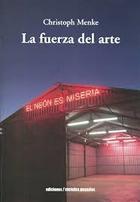
Never before has art been more visible, more present, and more decisive than it has been today, and at the same time it has never been so much a part of social processes: a commodity, an entertainment, an opinion, a knowledge, an action. The social omnipresence of art goes hand in hand with the growing loss of what we can call its aesthetic force. "Force" - unlike our "rational power" - here refers to the unconscious, playful, enthusiastic state, without which there can be no art. Philosophical reflection on this state leads Christoph Menke to the determination of aesthetic categories - work of art, beauty, judgment - and the projection of an aesthetic policy, that is, of a policy of freedom of the social and of equality without determination.









